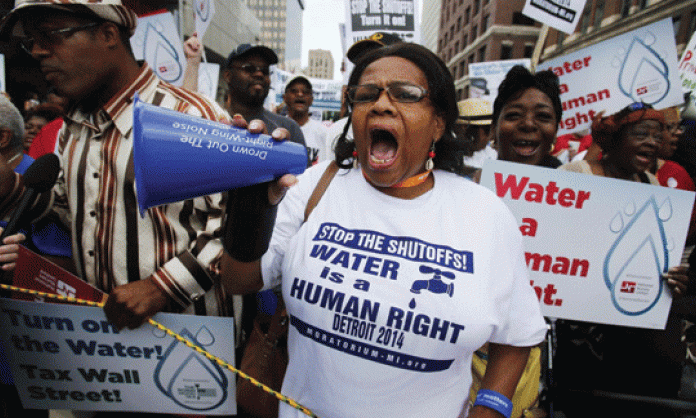The city of Detroit is currently bankrupt, reeling from car factory and related enterprise closures.
The city administrators are making working people bear the brunt, driving many out of their homes and out of the city, while a small area is gentrified. Whole neighbourhoods are disaster areas. Schools and community centres are being shut.
Now thousands are having their water cut off, creating a humanitarian and health crisis. Dianne Feeley, a former autoworker, long time socialist and activist with Detroit Eviction Defense, explains the unfolding crisis.
------------
I walked out of my apartment in mid-July to the sight of a water shutoff truck across the street. I looked around to see where the driver was – and found him trying to locate the valve to shut off the water to my neighbour’s apartment.
We are all renters and the landlord pays the water bill, but he said money was owed and there was an order to shut off the water – my apartment was next on his list! One of the apartments is home to a 5-year-old child.
I ran upstairs and called the management company. In the time since they took over the property, they hadn’t received a water bill! I was able to get the management company to call the water department and make arrangements to pay.
This was all over a $511 bill for four apartments over a three-month period. You would think that if a city department was empowered to shut off service, they would at least have to deliver a certified letter to the owner. That’s not the case in Detroit.
In May alone the Detroit Water and Sewerage Department (DWSD) sent 46,000 shutoff notices to residential customers who were 60 days in arrears or owed more than $150. Ten percent had their service shut off.
DWSD maintains that 120,000 residents are delinquent and hired Homrich Inc. to shut off water. The goal is to process 3,000 residents each week.
Once the water is shut off, a resident must pay the full amount plus a reconnection fee (typically $30) or pay at least one-third of the total amount owed plus the fee in order to enter into a payment plan.
Following a shutoff, the Michigan Department of Human Services can remove children from the home and place them in state custody.
Over the past decade, water and sewerage rates have increased 119 percent. Meanwhile Detroit’s unemployment rate is estimated to be 50 percent; the poverty rate is around 40 percent.
In 2006, the Michigan Welfare Rights Organization proposed a water affordability program for low income residents. The city council approved only a limited version.
The water department’s program – established through monthly voluntary donations of other customers – requires residents to jump through considerable hoops to obtain aid. Additionally, information on the website is in English only.
The city water department is one of Detroit’s jewels. It serves not just the city, but 40 percent of Southeast Michigan.
Various mayors have outsourced parts of the department over the last 12 years. This has delayed maintenance work. A 2012-commissioned report called for a workforce reduction of 80 percent, replacing existing staff with contract workers.
Now Kevyn Orr, the emergency city manager, wants to privatise or regionalise it (meaning Detroit would lose control).
The People’s Water Board Coalition, a group of Detroit activists, issued an open letter in June challenging both the shutoffs and the lack of transparency about the future of the water system.
It demanded immediate cessation of the shutoffs, restoration of services to households already shut off, and the implementation of a meaningful water affordability plan.
In response, the UN Office of the High Commissioner for Human Rights issued a press release stating that human rights law requires governments to take urgent measures – including financial assistance – to ensure access to essential water and sanitation: “The households which suffered unjustified disconnections must be immediately reconnected.”
Meanwhile DWSD has been investigating shutoff accounts to see if the household had been “stealing water”. Of the 178 investigated, they determined that 79 had been and stated they would be slapped with a $250 fee for the first offence, $500 for the second and $660 for the third.
The fee would have to be paid in full before the department would work with the resident to get their water turned back on.
This is not the first time there have been massive water shutoffs, but coming on top of all the other issues we are facing, attention is being paid to the problem!
Some organisations have set up Emergency Water Stations and Canadians living on the other side of the Detroit River are planning on bringing over water supplies.
Recently, about 50 demonstrators blocked the Homrich trucks from coming out of their lot. Several activists were arrested.
I’m active in Detroit Eviction Defense. We are currently working in Southwest Detroit, a predominately Mexican-American section of the city, and are leafleting and putting up “Justice Not Eviction” signs in English and Spanish, and trying to help people protect themselves from the shutoffs.
National Nurses United initiated a “Turn on the Water! Tax Wall Street!” demonstration on 18 July in downtown Detroit. The nurses declared “a public health emergency and demand a moratorium on the unprecedented water shutoffs”.
Three days later the water department announced a 15-day suspension of the shutoffs. This is a partial victory but the monthly water fee of $35-50 is too high for a city with 40 percent poverty. There is a water affordability plan, but eligibility requirements are onerous and the amount of money available ($1 million) is too little.
The struggle will need to continue.










